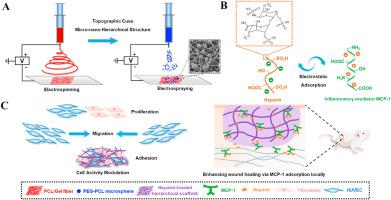Chronic non-healing wounds induced by oxidative stress and inflammation can activate inflammatory cells and produce large amounts of inflammatory mediators, which fail to maintain homeostasis in the skin and delay the wound-healing process. To tackle this issue, heparin-loaded hierarchical composite scaffolds comprised of electrospun fibers and electrosprayed microspheres were prepared to act as an effective anti-inflammatory wound dressing. Microspheres with different electrosprayed densities were deposited into the surface of the electrospun fibers for the improvement of surface topographical cues and cellular activities. The results indicated that the electrospun fibers followed by electrosprayed for 3 min to fabricate the composite fiber/microsphere scaffolds contributed to the best performance in terms of promoting cellular activities, with no obvious cytotoxicity, good adhesion morphology, and the fastest cell migration rate. In addition, a suitable amount of heparin was added to the composite scaffolds to alleviate inflammation. The significant adsorption efficiency of heparin-loaded composite scaffolds on inflammatory mediator MCP-1 indicates a favorable anti-inflammation effect in vitro. Furthermore, the heparin-loaded hierarchical scaffolds accelerated the pace of inflammatory wound healing in vivo when compared to commercial 3 M Tegaderm and non-heparin-loaded scaffolds. Our work provided a facile strategy for fabricating heparin-loaded hierarchical fiber/microsphere scaffolds to modulate cellular activities via topographical cues and accelerating the inflammatory wound healing process by electrostatic interactions between heparin and MCP-1. These findings suggested that the heparin-loaded hierarchical scaffold was expected to be a promising dressing for inflammatory wound healing.



